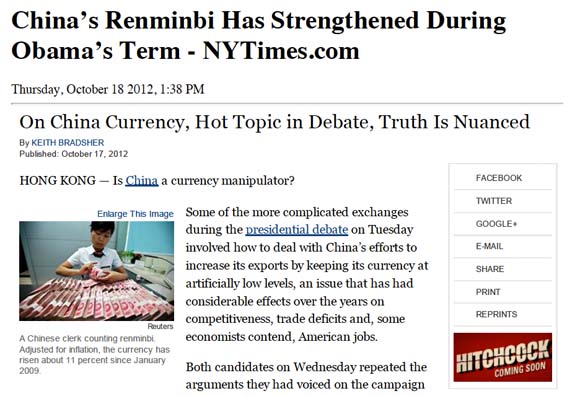Reaction: Worrying about China’s currency is oh, so 80s
Fellow Americans, who remembers the jokes about the Japanese from Reagan’s era? One day in the not too distant future its my prediction that the China bashing abounding today will be equally stale. That’s because it results less from any threats coming out of China and more from our own eagerness to look outward rather than fix our own problems. I am not trying to say that the relationship with China is without challenges. Instead, I am sadly saying that we are barking up the wrong trees.
Who else remembers this one: Reagan hits his head in the Oval Office, going into a coma. When he awakes he asks Bush the First: “How are things?” “Well, unemployment is done, efficiency is up, prices are stable. By and large everyone is healthy and happy.” “Wow,” says Reagan, “That’s great. What’s the price of bread?” “About 100 yen.”
So, when pundits and politicians seemingly suddenly coming to the conclusion that jobs are shooting across the Pacific like never before; continue pounding the RMB, even as it approaches real valuation; worry about specks of rock in a vast ocean where potential military escalation may erupt at any moment, threatening everything….and deciding that China is to blame…what can you say? “It must be election season.”
I am not trying to say that the relationship with China is without challenges. Instead, I am sadly saying that we are barking up the wrong trees. The most obvious one is currency.
The RMB has been a punching bag for so long no one has bothered to notice, or at least admit, that actually it has risen in value and is likely now nearing its proper valuation, even though it is not free-floating. For example, the New York Times had this story…
…which contains gems like these [emphasis mine]:
“The rise of the renminbi — up 12 percent since June 2010 on an inflation-adjusted basis and 40 percent since 2005 — has helped American companies by effectively reducing the cost of their products in China. In the last two years, American exports to China have risen sharply.“
“The renminbi has risen 8.5 percent against the dollar since June 2010, with the pace having slowed in the last six months. Taking into account the different inflation rates in the two counties, the effective increase is closer to 12 percent.
The rise has helped sharply reduce China’s current account surplus — a measure based largely on the difference between a country’s exports and imports. In 2007, the surplus equaled more than 10 percent of China’s gross domestic product, a level widely seen as unsustainable. Last year, the surplus fell below 3 percent.”
So, I hope that when you hear politicians in these few weeks haranguing China on these sorts of issues, I hope you will spare a synapse to consider: those problems are being addressed. While they may not have completely disappeared, they certainly appear to be on an agreeable track with plenty of verifiable evidential support. Just to be sure, I am certainly not the only one saying so. Again, from the article:
“Administration officials and members of Congress have chosen not to emphasize the appreciation publicly, partly to keep pressure on China. Widespread discussion of the change could reduce support in Congress for a bill that would impose sanctions on Chinese imports to the United States and that Beijing strongly opposes.
Similarly, the notion that the exchange rate was no longer as serious a problem as it had been could complicate American efforts to rally international pressure, from Brazil and other countries hurt by the renminbi’s value.”
So, it would seem to boil down to politics. But we are hurting ourselves. If we continue to chase after issues that are already being resolved, failing to recognize them publicly in order to score a few points, granting no credit to those on the other side of the table – we damage ourselves.
Another article puts things in even more perspective:
You might ask: “How much politics are we really talking about here? How prominently?” Does the presidential debate count? Is that prominent enough? Read on…
“Mr. Romney was caustic in accusing China of unfair policies.
“One of the ways they don’t play by the rules is artificially holding down the value of their currency,” he said. “Because if they put their currency down low, that means their prices on their goods are low — and that makes them advantageous in the marketplace.””
When candidates refuse to admit the improvement publicly, continuing to assert errors as facts, thereby adding fuel to the fire, who does it hurt? You. And me, to start with.
Just so we’re clear here, another gem from the article:
“Chinese inflation has now largely disappeared because of strict controls on bank lending and a slump in the real estate market. Consumer prices are now rising at about the same pace in China as in the United States, while wholesale prices are dropping much faster in China than in the United States.
The daily fixing of the renminbi’s value by the Chinese central bank is now almost exactly where it started the year, as the Chinese government has tolerated only small movements up and down this year. But there is little evidence the central bank is intervening on a large scale to suppress the value of the renminbi. It might even be acting to prevent it from going lower to avoid a political reaction in the United States.”
In yet another article, its even more plain:
“”I think we should declare victory,” said Nicholas R. Lardy, a senior economist at the Peterson Institute for International Economics. The Carnegie Endowment’s Mr. Dadush asserts that Mr. Romney’s pledge makes “no economic or trade policy sense, given what China has done and given its importance.””
So, if these are the right trees? What are the right ones? Where should be turning our attention and energy?
More about that another time.



